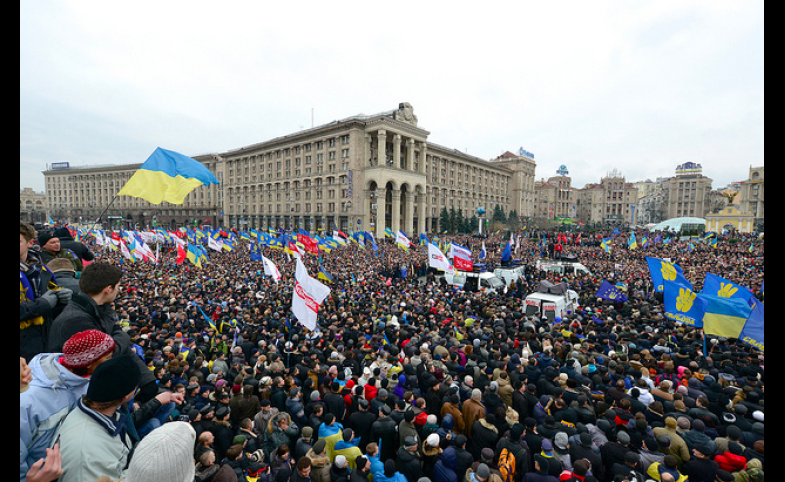The Financial Times recently published an AI-generated image of President Biden kissing former President Trump, with the subhead: “Fakes, forgeries and the meaning of meaning in our post-truth era.” The term ‘post-truth,’...
KEEP READINGThe CPD Blog is intended to stimulate dialog among scholars and practitioners from around the world in the public diplomacy sphere. The opinions represented here are the authors' own and do not necessarily reflect CPD's views. For blogger guidelines, click here.

Ukraine on the American River
The Crimean crisis hits close to home – very close for many in Sacramento, home to one of the largest Ukrainian diaspora communities in the United States. While targeted sanctions against Russia are about to kick in and the tense situation throughout Ukraine remains unpredictable, American policies going forward are likely to be influenced by Ukrainian nationals over time, even after the story fades from current news cycles.
First- and second-generation immigrant communities keep close tabs on their countries of origin, following political developments and looking for signs of danger back home. They are also often the first communities to organize and pressure their new country’s politics and policies.
That potential political activity will be generated in Sacramento because this is ground zero for Ukrainian communities in California. Other active expatriate ethnic California capitals are Yuba City for Sikh Americans originally from the Punjab, India; and Glendale, home to Armenian-America.
The 2000 U.S. census found 30,000 self-identified Ukrainians in Sacramento (with more likely uncounted), making this America’s second-largest concentration.
How they got here is a story of religious persecution, post-Soviet emigration, family reunificationand free-market opportunity. A dominant part of the community was initially attracted to Sacramento in part because of a locally produced evangelical shortwave radio program targeted at Christians behind the Iron Curtain and finding receptive ears in Ukraine. When emigration was possible, the local religious community rallied to provide a safety net, jobs and help with relocations to Sacramento.
Over a generation ago, they established their local spiritual, social and commercial communities and even helped bridge those communities to their former home. Davis developed a sister-city relationship with Uman, Ukraine. Just a couple of years ago, Rancho Cordova entered into a mayoral partnership agreement with the Ukrainian city of Novovolynsk.
But recent events have moved people and politicians from the niceties of cultural exchange to the tough call for political activism.
During the last few months, starting with the early stirrings of Ukrainian domestic discontent, I have witnessed a number of this community’s protest actions. In January, Sacramento Ukrainians legally blocked off the street in front of the German consulate in San Francisco.
The appeals from this gaily dressed crowd were directed at the German government to actively protect pro-European protesters in Maidan (Independence Square) in central Kiev. They passionately argued that it was Germany’s historic responsibility to fight for Ukraine’s European Union membership and modern liberation since Nazi Germany had caused so much suffering during World War II. At least 1.8 million Ukrainian civilians and soldiers died in that war. An astounding figure.
Now that Ukraine has been invaded, Crimea has been effectively annexed by Russia, and scores of protesting Sacramentans, waving Ukraine’s yellow and blue flag, no longer demand the overthrow of President Viktor Yanukovych’s corrupt government. They now target their ire at Russia andVladimir Putin.
Two weeks ago, standing amidst the crowd of protesters cordoned off by the San Francisco PD in front of the Russian consulate on Green Street (the consulate once called “Reds on Green”), I felt their power. They sang an accordion-led national tune and held up posters declaring that nobody “invited” the Russians to occupy Ukraine. They implored the crowd to visit and “Like” their “MaydanSF” Facebook page. The early stirrings of broader political organizing had begun.
Well-organized immigrant communities in California often can have an effect on their countries of origin. Transnational ties often lead to economic and political effects on the country of origin, with opposition or liberation movements finding American kindred ethnics a source of financial and political support.
It may take time and a continuing crisis in the Ukraine for local Ukrainians to move from street demonstrations to more direct action, but there is local precedent for how this evolution can occur.
Armenian Americans are highly organized, wielding tremendous political influence in both the statehouse and in Washington, D.C. They hold annual telethons and other awareness campaigns and are incessant in promoting a congressional resolution to recognize early 20th-century Armenian massacres in Turkey as genocide.
The Sikh communities of Northern California were instrumental in providing support for Punjabi separatists and at least partly funded those involved in the violent Golden Temple standoff in Amritsar in 1988. India is well aware of their contemporary activism.
Lately, the local Ukrainian Heritage Club has been spending a lot of time following and reacting to the tragic news. Lubow Jowa, the club president, recognizes a unique challenge in her community because of fear: “People who grew up in a totalitarian system are afraid of making a political gesture.” But if previous immigrant communities are any indication, then these relatively newly minted Ukrainian Americans may eventually end up making their voices heard in Washington and creating news of their own. As Jowa says, “We’re not stopping here by any means … this is not the last stage of the story.”
This piece was originally published on The Sacramento Bee.
To read the original piece, click here.
Visit CPD's Online Library
Explore CPD's vast online database featuring the latest books, articles, speeches and information on international organizations dedicated to public diplomacy.
POPULAR ARTICLES
-
January 29
-
January 20
-
January 28
-
January 2
-
January 8
Join the Conversation
Interested in contributing to the CPD Blog? We welcome your posts. Read our guidelines and find out how you can submit blogs and photo essays >.













